Open Access Week 2023
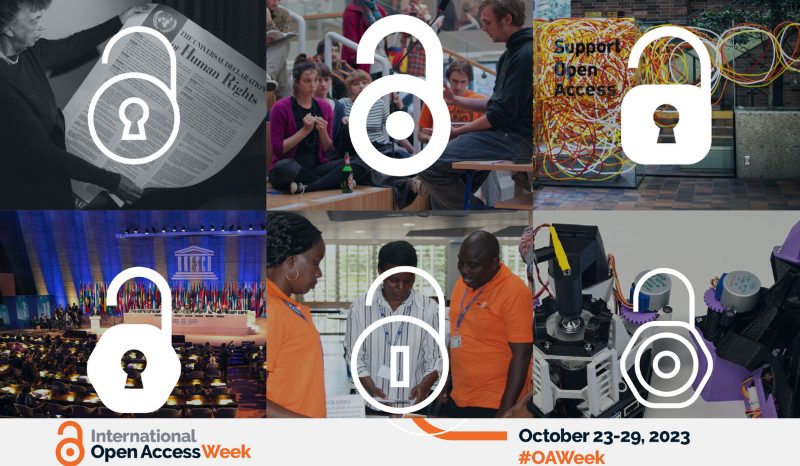
October 23rd marks the first day of Open Access Week! This Open Access Week, MacEwan Library would like to take this opportunity to applaud everyone who shares their research articles, data, education resources, and creative works openly online for others to read, use, learn from, and build upon.
Want Some Help Sharing Your Work?
MacEwan Library provides a range of services to help faculty and students share and digitally preserve their works at no cost:
- Archive scholarly and creative works, including exceptional student works, in MacEwan’s institutional repository, Research Online at MacEwan (RO@M).
- Publish student works in one of our undergraduate student journals.
- Develop an open textbook using MacEwan’s open access book publishing software.
- Deposit research data in MacEwan’s data repository.
- Create a digital scholarship project using the library’s Digital Exhibits site.
The Library also offers open access publishing discounts and resources to help find suitable open access publishers.
Questions about open access?
Contact Scholarly Communications Librarian Robyn Hall or connect with your Subject Librarian.
Introducing LibKey Nomad
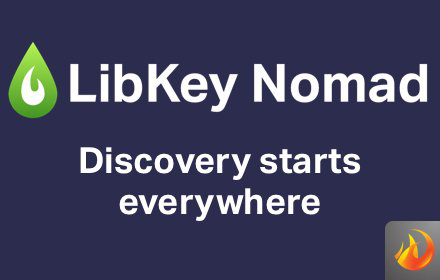
Searching Wikipedia, Google, PubMed, and other sites to learn more about your research topic? Download the LibKey Nomad browser extension in order to access scholarly articles you find on the open web for free from the Library.
Almost every Wikipedia article contains a references section at the bottom of the page with citations and links to websites, archives, popular magazines, and scholarly articles. When you click on those links, LibKey Nomad will automatically direct you to free Library resources. All major browsers are supported, including Chrome, Firefox, Safari, Edge, Brave, and Vivaldi.
Digital Display: Islamic History Month
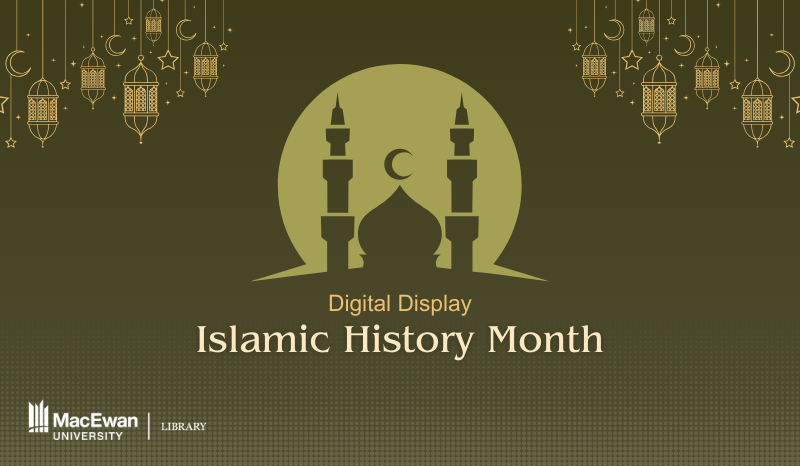
October is Canadian Islamic History Month. This is an opportunity to learn more about the history of Islam in Canada and recognize the many achievements of Muslim Canadians in the arts, sports, academics, sciences, literature and their communities. This display showcases some of these works which are available through the Library's digital collection.
To Read:
A History of Islam in Late Antiquity: Allah and His People
Islam: Between Message and History
Muslim Narratives and the Discourse of English
The Relevance of Islamic Identity in Canada: Culture, Politics, and Self
Muslim Pilgrimage in the Modern World
The Qur'an and Its Study: An In-depth Explanation of Islam's Sacred Scripture
Journey into Europe: Islam, Immigration, and Identity
To Watch:
Ismael: The Last Guardian
New Muslim Cool
Muslim Beauty Pageant and Me
Digital Display: Welcome to MacEwan 2023/2024

Welcome to MacEwan! These online library resources include strategies and tips to help you succeed as well as a few college-themed movies to help you decompress. Be sure to also check out our corresponding physical book display at the John L. Haar Library.
To Read:
The Dyslexia, ADHD, and DCD-Friendly Study Skills Guide: Tips and Strategies for Exam Success
Eat That Frog! for Students: 22 Ways to Stop Procrastinating and Excel in School
Teach Yourself How to Learn: Strategies You Can Use to Ace Any Course at Any Level
To Watch:
Student success series: A student's guide to getting back on track
Introducing BrowZine
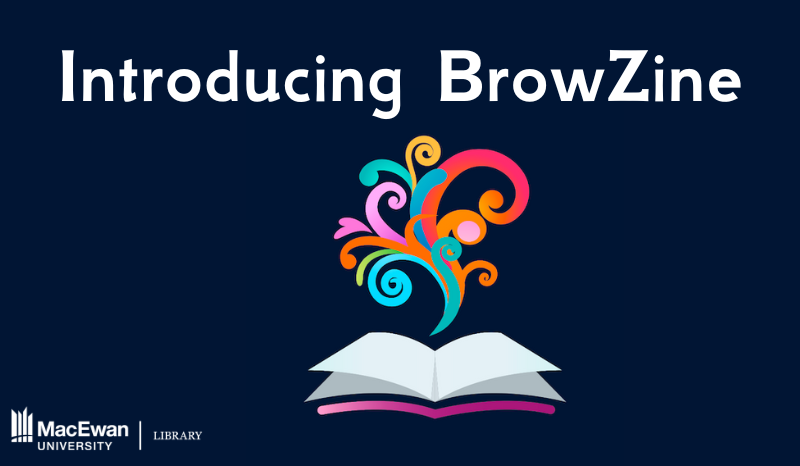
BrowZine is a new product recently added to the library’s database offerings that will be of particular interest to third- and fourth-year students and faculty. It provides a great way to browse online through most of the library’s scholarly journals published since 2005 in one easy-to-use interface. Try searching for the title of your favourite journal or create a list of all the journals in a specific subject area.
You can even set up journal alerts to never miss a new issue again. BrowZine will also allow you to:
- Sign up for a free account to personalize your experience (not required for basic use)
- Search for journals by title, subject, or ISSN
- Save articles and organize them in lists (referred to as “shelves” in a “bookcase”)
- Download and view articles in PDF
- Export articles to EndNote, Mendeley, Zotero, and more
- Switch between universities if you’re affiliated with more than one
- Find an article if the only piece of information you have is its DOI at https://libkey.io/
- Share links to specific articles using email or social media platforms
- Download an app for even easier access BrowZine is updated daily and includes access to some articles in press.
At this time, BrowZine will not allow you to search for articles by topic or keyword, like you may be accustomed to in our other databases. Try using the library search on our main page for those inquiries. BrowZine is available on the library’s website under “Databases,” which are organized alphabetically. Questions may be directed to Roxy Garstad at garstadr@macewan.ca. Look for more information on our website, including videos, over the next few months.
Digital Display: Indigenous History Month
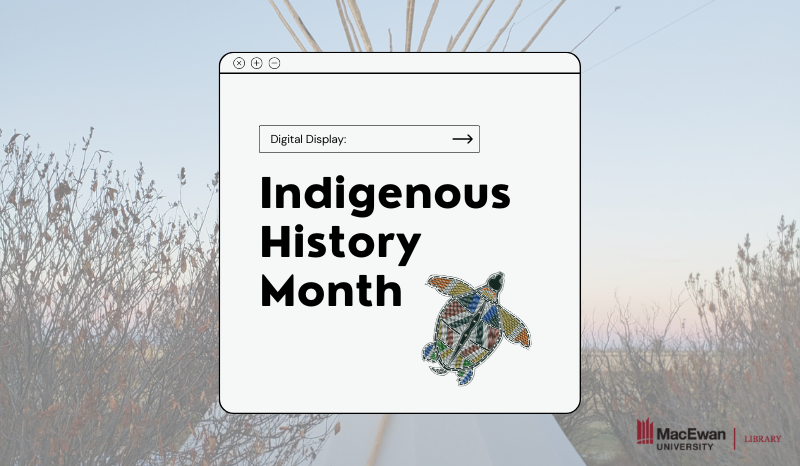
June is National Indigenous History Month! Every year, we celebrate Indigenous History Month, which falls around National Indigenous Peoples Day (June 21st). This is an opportunity to learn more about the history of First Nations, Métis, and Inuit people, who have lived on this land since time immemorial. To coincide with festivities, which run throughout the month, MacEwan Library has put together a number of films and books about Indigenous peoples and their histories.
To Read:
‘Métis’: Race, Recognition, and the Struggle for Indigenous Peoplehood by Chris Andersen
A Knock on the Door: The Essential History of Residential Schools from the Truth and Reconciliation Commission of Canada, Edited and Abridged by the Truth and Reconciliation Commission of Canada
A National Crime: The Canadian Government and the Residential School System by John S. Milloy
Arrows in a Quiver: From Contact to the Courts in Indigenous-Canadian Relations by James Frideres
Canada’s First Nations and Cultural Genocide by Robert Z. Cohen
Canadian Indigenous Literature and Art: Decolonizing Education, Culture, and Society by Carol A. Mullen
Carrying the Burden of Peace: Reimagining Indigenous Masculinities Through Story by Sam McKegney
Clearing the Plains: Disease, Politics of Starvation, and the Loss of Indigenous Life by James W. Daschuk
Disinherited Generations: Our Struggle to Reclaim Treaty Rights for First Nations Women and Their Descendants by Nellie Carlson and Kathleen Steinhauer
From Treaties to Reserves: The Federal Government and Native Peoples in Territorial Alberta, 1870-1924 by D. J. Hall
Gathering Places: Aboriginal and Fur Trade Histories by Laura L. Peers and Carolyn Podruchny
Histories of Indigenous Peoples and Canada by John Douglas Belshaw, Sarah Nickel, and Chelsea Horton
Indigenous Poetics in Canada by Neal McLeod
Indigenous Toronto: Stories that Carry This Place by Denise Bolduc, Mnawaate Gordon-Corbiere, Rebeka Tabobondung, and Brian Wright-McLeod
Indigenous Writes: A Guide to First Nations, Métis, & Inuit Issues in Canada by Chelsea Vowel
Let the People Speak: Oppression in a Time of Reconciliation by Sheilla Jones
Metis Pioneers: Marie Rose Delorme Smith and Isabella Clark Hardisty Lougheed by Doris Jeanne MacKinnon
Rekindling the Sacred Fire: Métis Ancestry and Anishinaabe Spirituality by Chantal Fiola
Spirits of the Grassroots People: Seeking Justice for Indigenous Survivors of Canada’s Colonial Education System by Raymond Mason, Jackson Pind, and Theodore Michael Christou
What the Eagle Sees: Indigenous Stories of Rebellion and Renewal by Eldon Yellowhorn and Kathy Lowinger
To Watch:
In the Footsteps of the Inuit: The History of Nunavik
Kwa’nu’te’: Micmac and Maliseet Artists
Truth and Reconciliation: The Legacy of Residential Schools in Canada
Digital Display: Pride Month
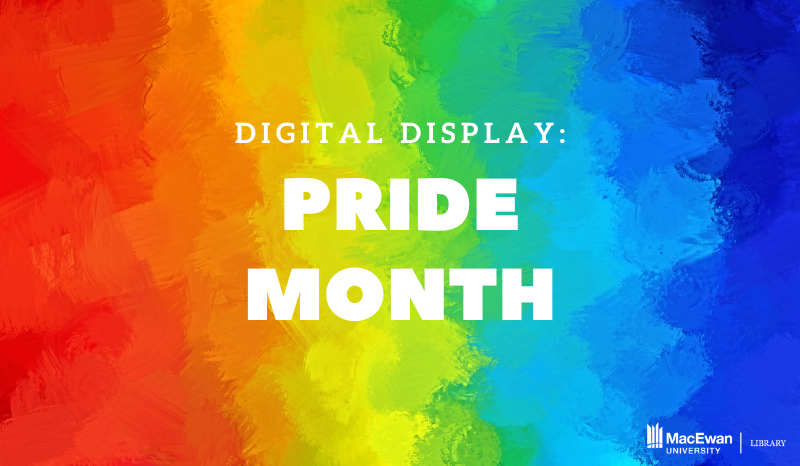
Tomorrow, June 1st, marks the beginning of Pride month! To kick off the month here at MacEwan, we've made a digital display of items that you can read or watch that showcase the history and purpose of Pride, and that celebrate LGBTQ2S+ stories, perspectives, and scholarship. Learn more about Pride in Edmonton here.
To Read:
LGBTQ Fiction and Poetry from Appalachia by Jeff Mann and Julia Watts
Love After the End: An Anthology of Two-Spirit and Indigiqueer Speculative Fiction by Joshua Whitehead
Pocket Guide to LGBTQ Mental Health: Understanding the Spectrum of Gender and Sexuality by Petros Levounis and Eric Yarbrough
Queer Images: A History of Gay and Lesbian Film in America by Harry M. Benshoff and Sean Griffin
Supporting Transgender Students by Alex Myers and E. Quincy McLaughlin
Trans Bodies, Trans Selves: A Resource for the Transgender Community by Laura Erickson-Schroth
Trans Power: Own Your Gender by Juno Roche
Trans Voices: Becoming Who You Are by Declan Henry
Transgender Voices: Beyond Women and Men by Lori B. Girshick
Transgender Youth: Perceptions, Media Influences and Social Challenges by Mya Vaughn
To Watch:
Digital Display: National Nursing Week
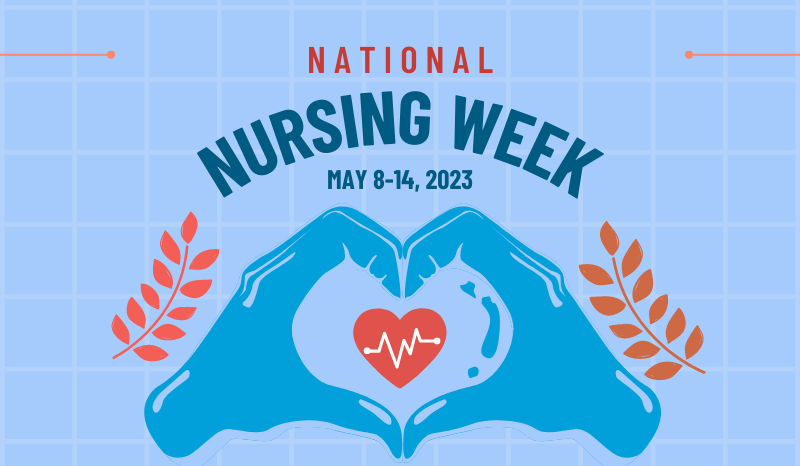
Hey MacEwan, May 8th to 14th is National Nursing Week! According to the Canadian Nurses Association, “The week draws attention to nurses, increasing the awareness of the public, policy-makers and governments of the many contributions of nursing to the well-being of Canadians.” To celebrate nurses' hard work, both on and off the MacEwan campus, the library has compiled a list of nursing-related items for you to enjoy!
To Read:
301 Careers in Nursing by Joyce J. Fitzpatrick, Emerson E. Ea, and Laura Stark Bai
Best Practices in Nursing Education: Stories of Exemplary Teachers by Joyce J. Fitzpatrick and Mary Jane Smith
Capstone Coach for Nursing Excellence by Linda Campbell, Marcia A. Gilbert, and Gary Robert Laustsen
Community Health Care Nursing by David Sines, Mary Saunders, and Janice Forbes-Burford
Empowerment Strategies for Nurses: Developing Resilience in Practice by Margaret McAllister and Donna Lee Brien
Fast Facts for Making the Most of Your Career in Nursing by Rhoda R. Redulla
Fast Facts for the Student Nurse: Nursing Student Success in a Nutshell by Susan Stabler-Haas
Feel the Pull: Creating a Culture of Nursing Excellence by Gen Guanci
Fundamentals of Nursing Made Incredibly Easy! by Lippincott Williams and Wilkins
How to be a Great Nurse – the Heart of Nursing by Julie Santy-Tomlinson and Carolyn Franklin-Mackintosh
More than Medicine: Nurse Practitioners and the Problems They Solve for Patients, Health Care Organizations, and the State by LaTonya J. Trotter
Nurse’s Pocket Guide: Diagnoses, Prioritized Interventions, and Rationales by Marilynn E. Doenges, Mary Frances Moorhouse, and Alice C. Murr
Nurses and Nursing: The Person and the Profession by Pádraig Ó Lúanaigh
Nursing in Criminal Justice Services by Ann Norman and Elizabeth Walsh
The Invisible Work of Nurses: Hospitals, Organisation and Healthcare by Davina Allen
The Nurse in Popular Media: Critical Essays by Marcus K. Harmes, Barbara Harmes, and Meredith Harmes
Toward a Better World: The Social Significance of Nursing by Mark Lazenby
When Chicken Soup isn’t Enough: Stories of Nurses Standing Up for Themselves, Their Patients, and Their Profession by Suzanne Gordon
Digital Display: May the 4th be with you…and more!
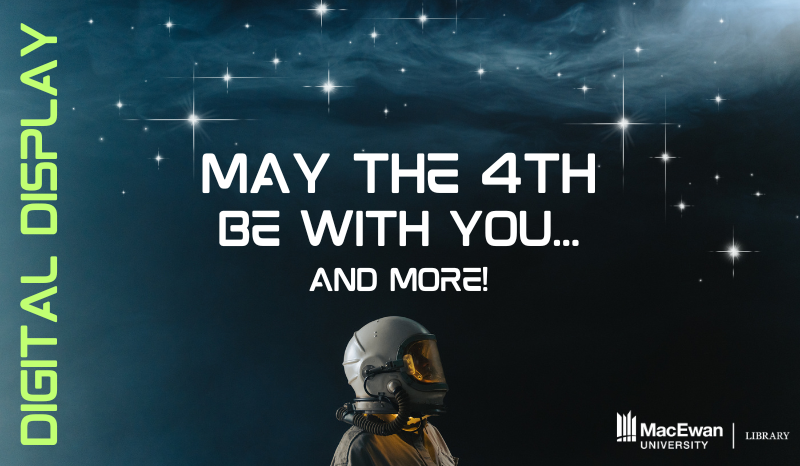
May the Fourth be with you, MacEwan community! MacEwan Library has a galaxy (far far away) full of materials on Star Wars, Star Trek, and all things Sci-Fi. If you are looking to escape with space-themed ebooks, movies, or music…in for a treat you are!
To Read:
Animating the Science Fiction Imagination by J. P. Telotte
Cyberculture, Cyborgs and Science Fiction: Consciousness and the Posthuman by William S. Haney
Fan Phenomena: Star Wars by Mike Elovaara
Gene Roddenberry’s Star Trek: The Original Cast Adventures by Victoria Amador, Douglas Brode, and Shea T. Brode
Identity Politics in George Lucas’ Star Wars by John C. McDowell
Interpreting Star Wars: Reading a Modern Film Franchise by Miles Booy
Myth, Media, and Culture in Star Wars: An Anthology by Douglas Brode and Leah Deyneka
Sex, Politics, and Religion in Star Wars: An Anthology by Douglas Brode and Leah Deyneka
Star Trek: A Cultural History by M. Keith Booker
The Light and Dark Sides of Star Wars by Serhat S. Serter
The Science of Science Fiction by Matthew Brenden Wood and Tom Casteel
The Star Trek Universe: Franchising the Final Frontier by Jonathan Alexandratos, Douglas Brode, and Shea T. Broder
The Ultimate Star Wars and Philosophy: You Must Unlearn What You Have Learned by Jason T. Eberl and Kevin S. Decker
To Listen:
Music from Solo, a Star Wars Story
Music from The Mandalorian, a Star Wars Story
Music from the Star Wars Saga: The Essential Collection
Star Wars and Other Sci-Fi Classics
To Watch:
The Mythology of Star Wars with George Lucas and Bill Moyers
Digital Display: Study Skills
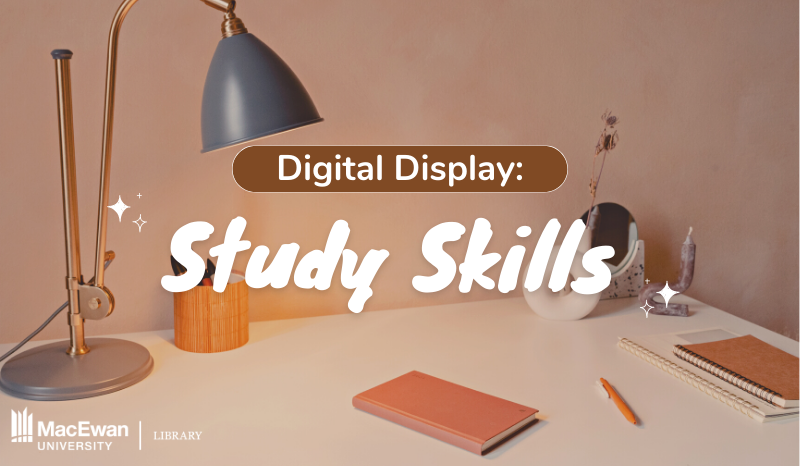
Congratulations MacEwan community, you’ve officially made it to the last day of classes for the Winter 2023 semester! Now all that stands in your way are final exams, and to help you prepare for them, the library has curated a list of items about academic success and study skills. Good luck!
To Read:
Academic Success by Cristy Bartlett, Tyler Cawthray, and Linda Clark
Blueprint for Success in College and Career by Dave Dillon, Linda (Bruce) Hill, Alise Lamoreaux, Phyllis Nissila, and Thomas Priester
Dear Teacher: Expert Advice for Effective Study Skills by William H. Peltz
Make it Stick: The Science of Successful Learning by Peter C. Brown, Henry L. Roediger III, and Mark A. McDaniel
Nursing: The Ultimate Study Guide by Nadia R. Singh
Pass Your Exams: Study Skills for Success by Andrew Holmes
Student Success: An Invaluable Resource for College and University Students by Mary Shier
Study Skills for Business and Management Students by Barbara Allan
Study Skills for Psychology Students by Jennifer Latto and Richard Latto
Study Smarts: How to Learn More in Less Time by Judi Kesselman-Turkel and Franklynn Peterson
Studying and Test Taking by Nina Simone Mosley
Teach Yourself How to Learn: Strategies You Can Use to Ace Any Course at Any Level by Saundra Yancy McGuire and Stephanie McGuire
The Guide to Learning and Study Skills: For Higher Education and at Work by Sue Drew and Rosie Bingham
The Return to Study Handbook: Study Skills for Mature, Distance, and Workplace Learners by Chloe Burroughs
University 101: Study, Strategize and Succeed by Christina Page